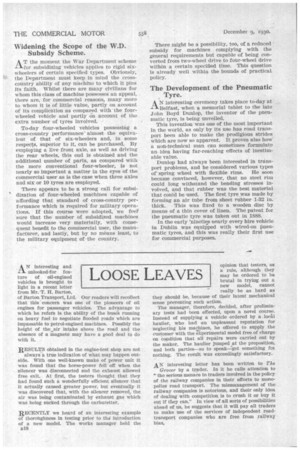LLOOSE LEAVES A N interesting and Clunlooked-for feature of oil-engined
Page 36

Page 37

If you've noticed an error in this article please click here to report it so we can fix it.
vehicles is brought to light in a recent letter from Mr. T. H. Barton, of Barton Transport, Ltd. Our readers will recollect that this concern was one of the pioneers of oil engines for passenger vehicles. The advantage to which he refers is the ability of the buses running on heavy fuel to negotiate flooded roads which are impassable to petrol-engined machines. Possibly the height of the...air intake above the road and the absence of a magneto may have a good deal to do with it.
RESULTS obtained in the engine-test shop are not always a true indication of what may happen outside. With one well-known make of power unit it was found that the horse-power fell off when the silencer was disconnected and the exhaust allowed free exit. At first, the testers thought that they had found such a wonderfully efficient silencer that it actually caused greater power, but eventually it was discovered that, with the silencer removed, the air was being contaminated by exhaust gas which was being sucked through the carburetter.
RECENTLY we heard of an interesting example of thorolighness in testing prior to the introduction of a new model. The works manager held the .1318 opinion that testers, as a rule, although they may be ordered to be brutal in trying out a new model, cannot really, be as hard as they should be, because of their latent mechanical sense preventing such action.
The manager, therefore, decided, after preliminary tests had been effected, upon a novel course. Instead of supplying a vehicle ordered by a locil haulier, who had an unpleasant reputation for neglecting his machines, he offered to supply the customer with the experimental model free of charge on Condition that all repairs were carried out by the maker. The haulier jumped at the proposition, and both parties—so to speak—got something lot nothing. The result was exceedingly satisfactory.
AN interesting letter has been written to The Grocer by a trader. In it he calls attention to "the serious menace to traders involved in the policy of the railway companies in their efforts to monopolize road transport. The mismanagement of the railway companies is notorious, and their only idea of dealing with competition is to crush it or buy it out if they can." In view of all sorts of possibilities ahead of us, he suggests that it will pay all traders to make use of the services of independent roadtransport companies who are free from railway bias, IT is curious how faults in one part or a chassis may be reflected in another. An instance of this is that a fierce clutch will sometimes result in holes forming in a worm wheel. The cause is that shocks are transferred through the Worm to the bronze worm wheel and harden it in spots, the metal from these eventually working loose and falling out. The trouble has sometimes been incorrectly blamed to blow-holes in the original casting.
IN a discussion on the subject of skidding, held under the auspices of the Institution of Automobile Engineers last week, various speakers stressed the complexity of the problem. There are many factors in the design of the vehicle itself which influence the results, such as weight distribution, height of centre of gravity, braking system, shape and distortion of tyres and characteristics of the springing. It was pointed out that in a goods vehicle the area presented to a cross wind is large, so that on a gusty day the effect produced by air pressure may be quite considerable. Yet another speaker instanced tank vehicles in which, despite internal baffles, the liquid load may surge to some extent on corners, so producing driving difficulties.
IN quite a number of American vehicles a spongy graphite-bronze, which is self-lubricating to some extent, is being employed for engine and other bearings. This avoids the need for scraping, as they are merely bolted up to the shafts, the engines being run in by belt. The graphite prevents seizure until its work is taken over by the oil film. We should imagine, ,however, that there must be some difficulty in the way of servicing such bearings.
The ordinary form of oilless bearing, which was formerly used to a considerable extent for shackle pins and other exposed parts, has not proved highly satisfactory, as it is difficult—in fact, well-nigh impossible—to prevent the entry of moisture and dust.




































































































